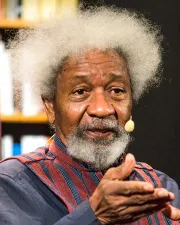2023 Election
Soyinka condemns the results of the most recent elections.

Prof. Wole Soyinka, a Nobel Laureate, gave a critical assessment of the general elections in 2023, calling them among the worst in Nigerian history.
The attacks on non-indigenous people in the many states where there was unrest during the presidential and gubernatorial elections were strongly criticized by him.
Prof. Soyinka referred to the violence that marred the election as terrible and shameful in an interview with ARISE NEWS yesterday.
He claimed that many Nigerians who had hoped for a more credible, free, and fair process had been disappointed by the results of the elections.
In order to allow for “fresh blood” and to bring in new and revitalized thinking for the good of the country, Soyinka noted that he had suggested that the established contenders step aside before the elections.
The Nobel laureate elaborated on the organizational structure he prefers for the nation, stating that its decentralization would enable each of the numerous arms, all the way down to the local level, to carry out their responsibilities autonomously.
In addition, Soyinka charged that the media was undermining public discourse by taking a stand on political issues rather than presenting information objectively for debate, particularly in light of the comments made by Labour Party vice presidential candidate Datti Ahmed.
Soyinka denounced him for making remarks that he believed were dangerous and would cause national unrest.
“I have never heard anyone threaten the judicial system in the manner Datti did. Blackmailing behavior. We are not fighting for do-or-die provocation, he said.
The Peoples Democratic Party (PDP) and the Liberation Party (LP), the two main opposition parties, had denounced the election, citing numerous instances of voting suppression and intimidation by APC operatives (APC).
Both are contesting the Independent National Electoral Commission’s declaration of Asiwaju Bola Ahmed as the winner of the presidential election in the Presidential Election Petition Tribunal (INEC).
The European Union Election Observation Mission (EU EOM) had additionally claimed that INEC’s lack of openness had tainted the polls.
The mission said that the gasoline and Naira shortages were impeding INEC’s ability to function, and it listed the exploitation of the incumbent candidate advantage as well as an unsettling election security environment as some of the elements that created unfair competition for the candidates.
At a press conference in Abuja, the EU’s EOM Chief Observer, Barry Andrews, emphasized that on the day of the election on February 25, the confidence in INEC was seen to further decline as a result of sluggish polling processes and information gaps related to much-anticipated access to results on its Results Viewing Portal (IReV).

